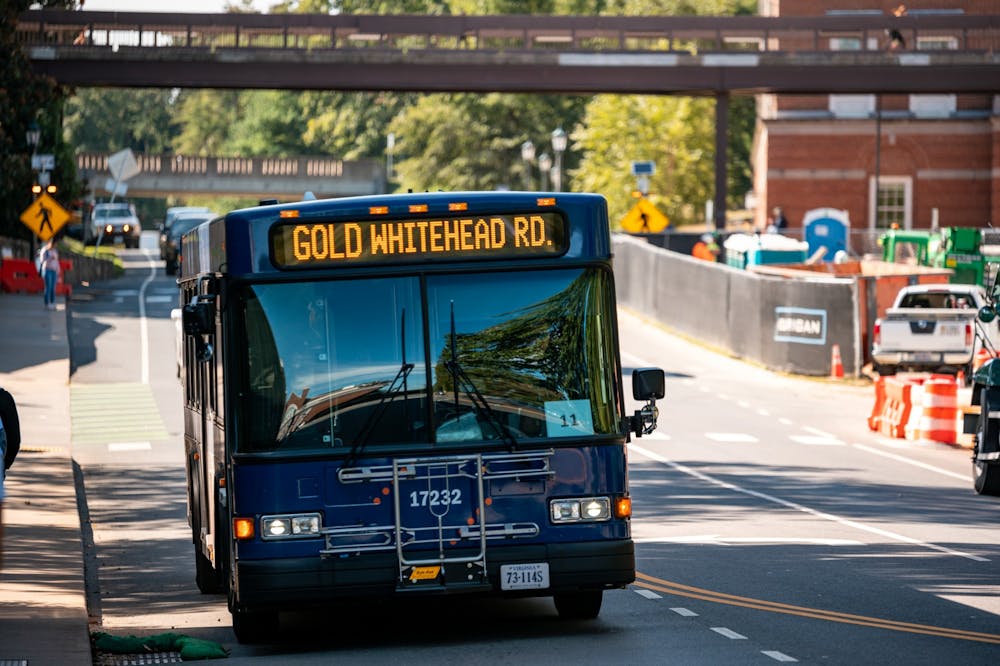DivestUVA hosted a political education event Monday evening with students and local environmental activists to discuss ways to make the University more environmentally friendly by improving public transportation and committing to divestment in fossil fuels.
Panelists were invited to speak from organizations such as Third Act, the Community Climate Collaborative and the Charlottesville chapter of the Democratic Socialists of America. Third Act — whose members are all above the age of 60 — and the Community Climate Collaborative are both organizations promoting climate justice activism.
DivestUVA was founded in 2015 to advocate for climate justice. Their primary goal is advocating for University administration and the University Investment Management Company to commit to divesting all financial support from the fossil fuel industry. The group has hosted several activism events in past years, including an Earth Day rally in 2022 during which over 100 students and community members gathered on the steps of the Rotunda to call for divestment by the University.
Maille Bowerman, DivestUVA organizer and third-year Architecture student, said the organizers of the event wanted to teach students about local activism about important climate topics such as investment in fossil fuel infrastructure and the transit community.
“One of our main goals was to highlight what local environmental organizing looks like and connect what's going on at U.Va. to Charlottesville,” Bowerman said. “I think that's one area where U.Va. students sort of have a blind spot.”
Making public transportation more accessible and greener was the main topic of concern raised by panelists during the event — transportation is responsible for roughly 30 percent of carbon emissions in the city of Charlottesville.
Co-chair of Livable Cville Matthew Gillikin said the University needs to improve the infrastructure of streets and public transportation by increasing bus driver wages and making pedestrian sidewalks safer rather than spending money on other programs — like constructing parking garages which require high amounts of fossil fuels to build. Liveable Cville — a volunteer based activist group located in Charlottesville — focuses particularly on advocating for sustainable public transportation and for affordable housing.
“Why can’t you be spending that money to help create a more sustainable future for our area?” Gillikin said.
Other panelists echoed these sentiments and said there is a need for a better bus system that is reliable and convenient for community members to use.
In addition to discussing public transportation, the panelists discussed the University of Virginia Investment Management Company. UVIMCO oversees fund allocation and investment of the University’s endowment and has a direct role in deciding which companies the University invests in. Currently, UVIMCO has committed to transitioning the University's endowment and other investments to net-zero carbon by 2050.
According to the panelists, UVIMCO has reduced fossil fuel investments by 60 percent, but DivestUVA said the University’s goal to have a net-zero investment portfolio by 2050 doesn’t seem plausible because it would be hard to quantify and difficult to achieve.
“We think that [the net-zero investment portfolio] is very much a hollow commitment,” Bowerman said. “And especially considering that it is incongruent with U.Va.’s own commitment to sustainability.”
Despite some movement in financial divestments in UVIMCO, Gillikin said the University continues to fund fossil fuel companies and pollution through projects such as the construction of Ivy Corridor, where the University is currently building a hotel, conference center and School of Data science. These projects, Gillikin says, oppose community members’ voices.
Outside of Grounds, panelists discussed the city’s steps towards environmental protection. Charlottesville adopted a local Climate Action Plan last month, which outlines how the city can reach carbon neutrality by 2050. Katie Ebinger, a climate policy analyst at Community Climate Collaborative in Charlottesville, said policies like this are exciting despite slow progress by the state government.
“Even if things are not looking great at a national or state level, we can still be fighting all the time on local issues,” Ebinger said.
Ebinger said even though many political decisions regarding environmental policy often happen at a national and state level, there is an impact local and student government can have on making a positive difference in Charlottesville — as well as grassroots student organizations.
“We've seen a lot of great progress in the last year and we hope that continuing to have these conversations will help [the University] follow through,” Bowerman said.







